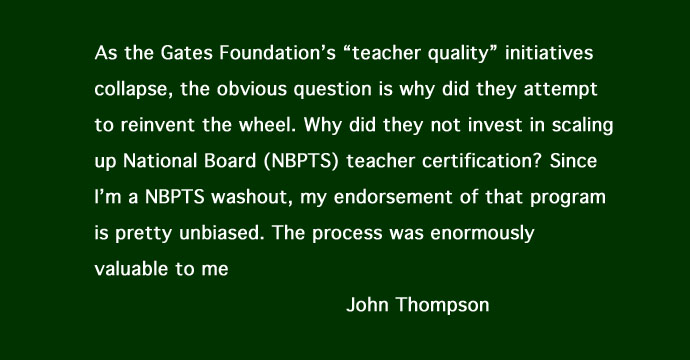A Historian Reflects on Failing at National Board Certification

By John Thompson.
Even as I tried to distance myself from the computer over the holiday season, edu-politics kept drawing me back. Since my book, A Teacher’s Tale, has been released, I reread the manuscript’s my first draft. Mostly, I did so to revisit the stories of students that were edited out, but I also stumbled across accounts of issues that I previously avoided when blogging. I also sought to come clean on mistakes I’d made that were cut from the manuscript. Fortunately, none were as indefensible as the unforced errors that were caused by corporate reformers’ micromanaging of worlds that they knew nothing about.
As the Gates Foundation’s “teacher quality” initiatives collapse, the obvious question is why did they attempt to reinvent the wheel. Why did they not invest in scaling up National Board (NBPTS) teacher certification? Since I’m a NBPTS washout, my endorsement of that program is pretty unbiased. The process was enormously valuable to me and I was not punished by failing to pass its tests. The national certification process also produced a great record of my students’ experiences during my training. So, this post will get my constructive criticisms with the NBPTS grading out of the way so that subsequent posts can focus on my students.
I fell 39 points short of earning NBPTS certification. I took consolation in the numbers showing that it wasn’t so much the evidence of my instructional quality that brought my score down. The tests on knowledge of subject matters had cost me 77.63 points. Then and now, it seemed clear to me that I had more academic knowledge about those subjects than the test-makers did but maybe I, the historian, and they, the education test-makers, spoke past each other. So, I might as well get my big, systematic concern out of the way, while touching on my complaint about questions and answers regarding educational expertise.
Then and now, it is hard for the education profession to admit that equally great teaching looks very different in high-performing as opposed to low-performing schools. Moreover, most teachers do not work in extremely high-challenge schools, so many or most (and most test graders?) have limited knowledge of the circumstances that undermine instruction in the most at-risk schools.
My scores on the lessons in the type of classes that most educators would recognize were 3.00 and 3.25 on a A Historian Reflects on Failing at National Board Certification - Living in Dialogue:
